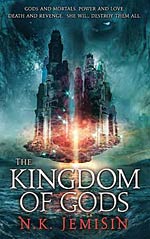
![]() nightxade
nightxade
2/3/2015
![]()
It's taken me almost three years to finally finish the Inheritance Trilogy. As I'm mentioned numerous times before, the previous books tied me up in emotional knots. The Kingdom of Gods? Not so much.
This book follows the godling, Sieh, son of the Three who created the world and all who live in it. Their love and their jealousy almost broke that very same world and killed many of their children. At the end of the Gods War, Sieh, his father Nahadoth, and several other godlings ended up trapped in mortal bodies, enslaved to the whims of Arameri people. When they were finally freed, they had their revenge against the god Itempas who allowed the Arameri to imprison them, by exiling him to mortality. But through all of the hate in millennia that past, there was always love, and that is what Jemisin explores through the eyes of a god whose nature is that of childhood, who in turn is cursed with mortality again and forced to grow up, literally and emotionally.
Unfortunately, this was all very tedious for me. Particularly because of Sieh's nature. He is a trickster god, the god of play, and his antithesis is growing up. A Peter Pan, per se - who constantly has to remind you about all of that. And about the nature of all the other gods and godlings he meets, as well as the arrogant Arameri that rule the Hundred Thousand Kingdoms, two of whom Sieh is in love with. This book is also about the depths of loneliness that Sieh experiences and sees in those he lovehates - which Jemisin also frequently reminds the reader of.
The significant difference between this book and its predecessors is that it is told in first person through the eyes of a godling who perhaps believes he knows more about mortals and gods than he actually does. The reiteration of the nature of this people and that is exactly how Sieh sees the world and interacts with it. But it was frustrating for me as the reader to deal with. Perhaps if the story had been told through Shahar Arameri, the heir to the Arameri kingdom. Along with her twin, Dekarta, and Sieh, she makes up the third in an unusual tryptic whose friendship threatens everything.
That's not the major threat to the situation though. Similar to The Broken Kingdoms, there is a group and a sudden new enemy, conveniently hidden away all this time, who seeks to end both the Arameri reign, and the reign of the gods. The Big Bad - Kahl - is meant to pull on the heart strings when we discover who he is, but his existence lacked enough justification for me to feel anything for either him, or for Sieh because of him.
Magic and the power of the gods themselves feature prominently, with particular focus on how that magic is distributed through the bloodlines. I always love unique explorations of magic in fantasy stories, and for the most part, this doesn't fail me, particularly with the newer godlings and demons learning what they can go do with their abilities. Still, some of their abilities seem a bit too convenient, and the characters themselves not fleshed out quite enough for me to appreciate them.
Two whole stars go to the appearances of Nahadoth, whom I've already gushed over in a character appreciation post. The Nightlord is a beautiful and elegant creature of chaos. We have seen him in wrath, in utter desolation, in sadistic pleasure, and in passionate and complete love. Here, we get to see yet another side to his mutable appearance, as a parent who loves his son dearly. Because, while I am disappointed in this book as a whole, I have always loved Jemisin's gods. Perhaps an entire book from Sieh's point of view was too much, but Jemisin still gave me an interesting insight into the very human nature of creatures who believe themselves to be well above mortals.